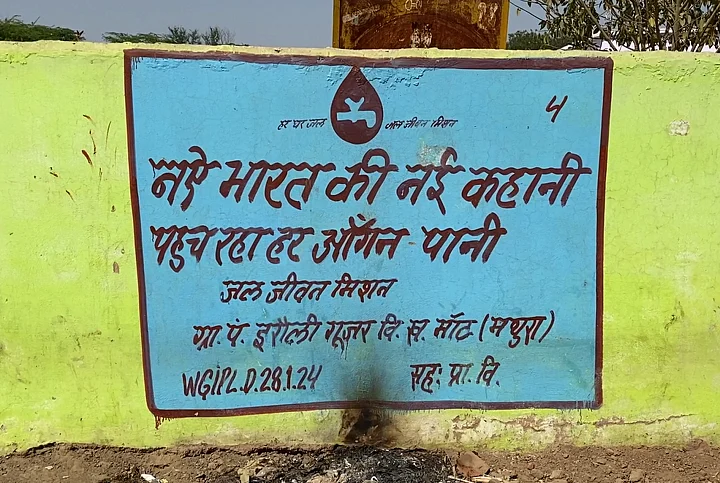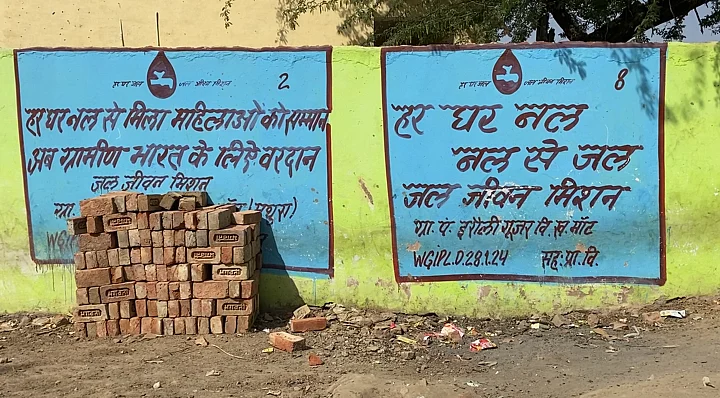Camera: Shiv Kumar Maurya
Video Editor: Purnendu Pritam
Jal Jeevan Mission: As elections take the centre stage, we are here to take stock of one of the most advertised and popular flagship schemes of the BJP-led government: Jal Jeevan Mission.
Prime Minister Modi has praised the project several times in the past, stating that "what couldn't have been achieved in 70 years, much more work has been done within 7 years."
Launched in August 2019, also known as 'Har Ghar Jal' the aim has been to provide "safe and adequate drinking water through individual household tap connections by 2024 to all households in rural India."
Four and half years later and as we reach closer to being halfway through 2024, how much impact has Jal Jeevan Mission made in rural India? Moreover, has it led to political shift, a change in electoral choices on the ground?
Around 400 kms from the capital of Uttar Pradesh is Mathura, a holy city and a BJP-stronghold, it is also one of the driest cities in the state, receives very low rainfall and has 'khaara'(salty) water.
Thus, The Quint travelled to Mathura to see whether JJM has made any impact as the government claims as this city heads into elections in phase 2 on 26 April.
You can read our other reports on Mathura and on 2024 Lok Sabha Elections here.
'If Nothing Is Done in 10 Yrs, Will 5 More Yrs Be Given?'
Across the Iroli Gujar village in Mathura, there were these paintings on the walls with the message:
"New story of New India, water is reaching every household," and "With water in every house, women have got respect, now it's a new blessing from rural India."
Kamal Singh, a farmer who was born and raised in Mathura said JJM is an addition to the promises he hasn't yet seen being fulfilled on the ground, "First they promised 15 Lakhs into our account or expose black money, the poor and the labour thought even if they don't 15 but 5, they would get something."
"See, in elections, if anyone is lying then people will see it for 2 years, 3 years, 5 years, but then 10 years and even in 10 years nothing is done, then will 5 more years will be given to you then? Nobody is that blind."Kamal Singh, Farmer, Mathura
As he spoke, women in the village picked up empty buckets on their heads, getting ready to re-fill them.
"In the morning, it takes our women an hour to go and get the water, then they will make the tea, especially if the water is fresh and clean. Then they cook food. Then they go to the fields to work, which are a kilometer away, by then water gets over and to get it again they come back," Singh told The Quint.
Reena, another local of the same village stated that they haven't received any help from the government's Jal Jeevan Mission so far.
"Every day, it's still the same for us. Two-three times in a day, we have to get water from outside, separate water for everything, for clothes, for drinking and for utensils that we wash. The clean water is used for washing clothes If we wash clothes with the salty water the cloth gets stiff and rough."
Singh also stated that the government authorities installed an RO tank just kilometer away from their village but it does not work. When The Quint reached the tank, a local women, quite agitated said, "Why is this tank even here? It worked once in the beginning and hasn't worked since. Is it a joke? Throw it away!"
Co-incidentally, in February this year, the Union Jal Shakti Minister Gajendra Singh Shekhawat stated that the Jal Jeevan Mission project is on the verge of being completed, way ahead of their 2030 deadline.
'PM-AWAS Houses Also Don't Have Water Supply'
Some kilometers away from Iroli Gujar village and close to the city, The Quint found two houses close to each other which were provided by the PM-AWAS Yojana.
Residents of both the houses, Munni and Bubbly, told us that they don't have a tap or water supply connection. In 24 hours and sometimes in 2-3 days, they get water once.
"Motor is not working, how will I get water? Four days later, we've got water and the motor worked. Vote will be cast and will go to someone. Vote will go to whoever will ask for it. We will cast the votes, we won't keep it with ourselves," said Munni.
As we spoke, many empty buckets and containers lay behind her, waiting to be filled.
Bubbly, on the other hand, stated that even though they get water once in 24 hours, have to fill water from the tanks and haven't seen Jal Jeevan Mission making any impact on their lives, she said, "I will still vote for Modi ji."
Similar sentiments were echoed by Chetan from Jarara village who praised the government for the construction of a water plant and said, "Whether I get water or not, I will vote for Modi ji, I am a Modi bhakt."
As of March this year, about 72-74% of India’s 19.3 crore rural households have received tap connections, as per JJM.
In UP alone, the number of tap connections have risen from 5.1 lakh in 2019 to 2 crores, the highest among all States.
Back in October 2023, The Quint filed an RTI with the Jal Shakti Ministry , the project comes under this ministry.
However, on being asked details about the budget, villages and follow ups done by the authorities, the Centre in its response told us to approach the state government in this matter.
Minister of State for Jal Shakti, Shri Rajeev Chandrasekhar in a written reply in Rajya Sabha in February, stated that in the current financial year i.e. 2023-24, an amount of Rs. 70,000 Crore have been allocated under the Mission.
"Out of this, an amount of Rs. 54,635.51 Crore has already been released to the eligible States/UTs. Further, from the total available fund with the States including their matching States share, as on 30.01.2024, amount of Rs. 1,13,670 Crore has been reported as utilized by the States," PIB release reads.
Moreover, The Quint visited Dinesh Kumar, the Executive Engineer at Jal Nigam office in the city.
Kumar is positive that the efforts of JJM will be completed in the city by January 2025. He elaborated the biggest obstacle has been the omnipresent poor water quality in Mathura.
"Under Jal Jeevan Mission, the issues that we face in Mathura with water quality. There is a lot of TDS and fluoride in water here, hence, we are not working on sub-surface level, meaning not working on tube wells," Kumar told The Quint.
When our team visited the place in Bera village, Naujheel block, we saw the tank is only in its initial stage of construction and the engineers at the spot said the work would take much more time January 2025. The water will be collected, treated and then facilitated to the city from the tank.
Even as the reality on ground far contradicts the Shekhawat's claims of the project being completed, water continues to be a major issue even in the urban areas.
Such as Mohanpura in the main city, which has a mixed population of Dalits and Muslim predominantly.
Here, there are two massive tanks, one of them being from the British period, yet the locals claim neither of them has worked since decades and this particular locality in the city does not receive water from the government at all.
"What is point of spending public's money when this is situation of water in Mathura?" said one of the locals, while the other remarked in a rather sarcastic manner, "It is all Modi's wave on the ground, if he say even today that he'll provide water, people will vote for him."

